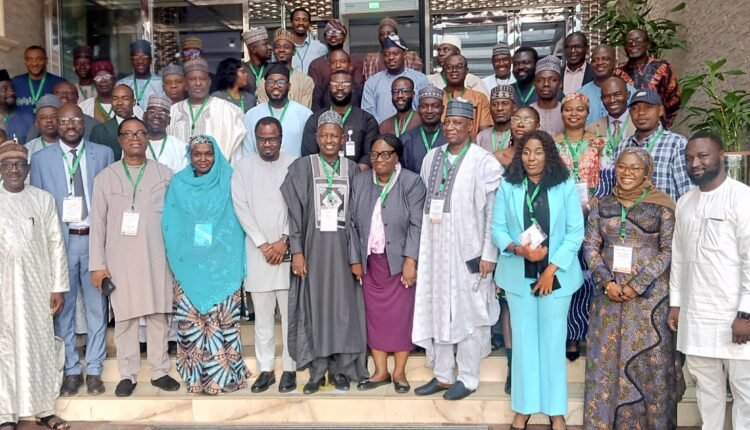FG, IFAD partner on climate-smart farming
The Federal Government and the International Fund for Agricultural Development (IFAD) have partnered with the Global Centre on Adaptation (GCA) to provide climate resilience and adaptation support for the Value Chain Programme in Northern Nigeria.
This was the thrust at the inaugural workshop of the GCA Technical Assistance to the Value Chain Programme in Northern Nigeria (VCN) on Tuesday in Abuja.
VCN is a flagship initiative co-financed by the federal government, IFAD, and the French Development Agency (AFD).
It aims to improve livelihoods, enhance agricultural value chains, and build the resilience of smallholder farmers across nine northern states.
It may be recalled that on May 8, the federal government and IFAD had signed a “Joint Roadmap for Accelerated Start-up of the VCN” to expedite the programme’s readiness and ensure its full implementation.
Mr Bukar Musa, Director of the Project Coordinating Unit, Federal Ministry of Agriculture and Food Security (FMAFS), stated that the partnership is a testament to their shared commitment to innovation in pursuit of a climate-resilient future.
He emphasised that this initiative by GCA demonstrates their collective resolve to tackle the challenges posed by climate change.
Musa noted that, together, they will leverage cutting-edge adaptation solutions, scientific expertise, and best practices to protect the agricultural sector from climate impacts and ensure food and nutrition security for the nation.
He identified the northern states as playing a crucial role in the nation’s agricultural landscape, especially in food and cash crop production, while also facing vulnerabilities following impact of climate change.
“The VCN will provide a strategic response to these challenges. By focusing on enhancing climate resilience throughout the agricultural value chain, from production to market access, we aim to ensure sustainable food and nutrition security for our people.
“This initiative will not only strengthen the resilience of smallholder farmers but also promote inclusive economic growth and rural development,” Musa said.
He added that the technical assistance provided by GCA will equip the country with a deeper understanding of climate vulnerabilities in key value chains such as rice, maize, and groundnut, ensuring robust adaptation strategies to address these vulnerabilities.
Dede Ekoue, IFAD Country Director, remarked that the VCN programme aligns with national policies and regional priorities aimed at transforming the agricultural landscape of northern Nigeria.
She noted that the inauguration marks the beginning of their collective platform for strengthening food systems, empowering communities, and building resilience across northern Nigeria.
Ekoue stated that the programme would have a multiplier effect on food security and nutrition, empower smallholder farmers and agri-entrepreneurs, and foster inclusive and sustainable economic growth, while building resilience to climate change.
She described the VCN as a major step by the federal government to transform the agrifood systems for food security and inclusive, resilient growth in line with the Renewed Hope Agenda.
Read Also: NAPTIP, ICMPD alert public on new human trafficking tactics
“The project aims to sustainably reduce poverty, enhance nutrition, and improve the resilience and income of smallholder farmers and the most vulnerable populations in the nine northern states of Borno, Bauchi, Kano, Katsina, Kebbi, Jigawa, Sokoto, Yobe, and Zamfara.
“The VCN will leverage both existing and new initiatives in the northern region to catalyse transformative success, while also connecting with Special Agro-Industrial Processing Zones (SAPZs) to create win-win benefits for food security, farmers, youth, women, agro-processors, and agro-industries,” she said.
Ekoue added that through the VCN, the federal government is working with local and international partners to fast-track the link between humanitarian aid, peace, and development for sustainable impact in the region.
“These achievements include ensuring food and nutrition security, promoting economic development, and fostering social resilience, including climate resilience and social cohesion among Nigeria’s northern rural populations.
“Today marks a significant milestone in the journey to implement the joint roadmap for the accelerated start-up of the VCN, which was signed on May 8, 2025.
“The assistance from GCA will help lay the foundation for the VCN, enabling the acceleration of climate-smart and digitally integrated agri-food systems.
“This workshop serves as a collaborative space for us to co-create solutions and reaffirm our shared responsibility in addressing climate challenges, including through practical and digital solutions that strengthen food systems and advance rural development in the north,” she said.
Mr Oluwabunmi Ajilore, Senior Programme Officer at GCA, explained that the organisation’s partnership with the government is driven by the current climate hazards, such as droughts and floods, which are impacting the country’s food security and food systems.
“We need to ensure the climate resilience of farmers and their livelihoods to strengthen our food system.
“In particular, with the VCN project, we are assessing the climate vulnerabilities of key value chains such as rice, maize, and groundnut in the states where this project is being implemented, and adopting appropriate adaptation solutions,” Ajilore said.

